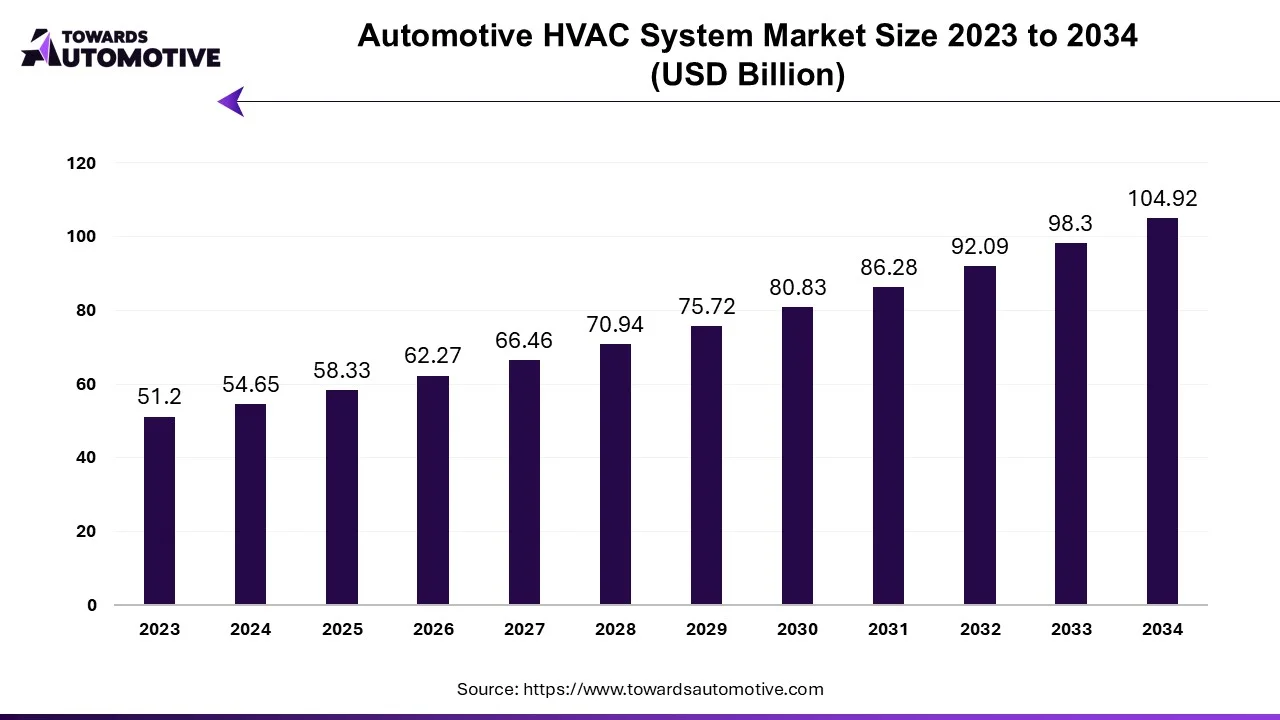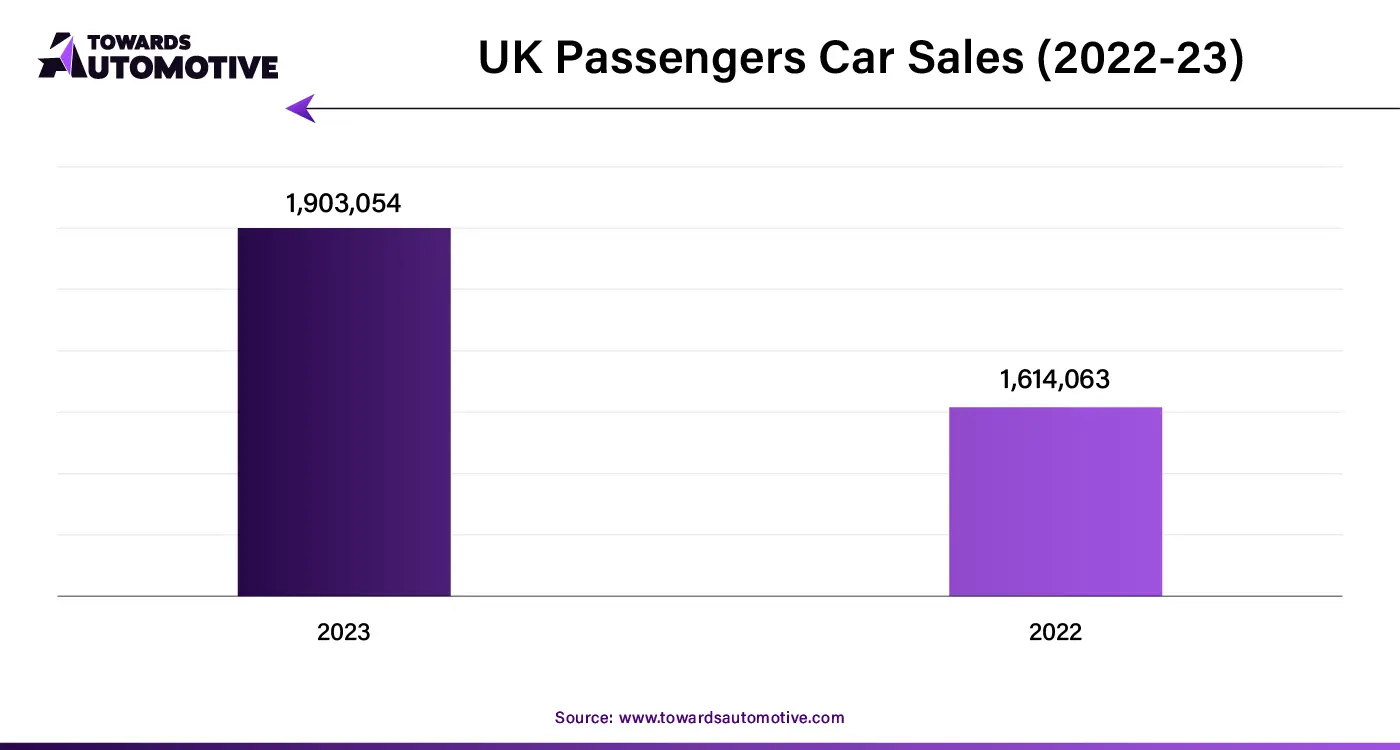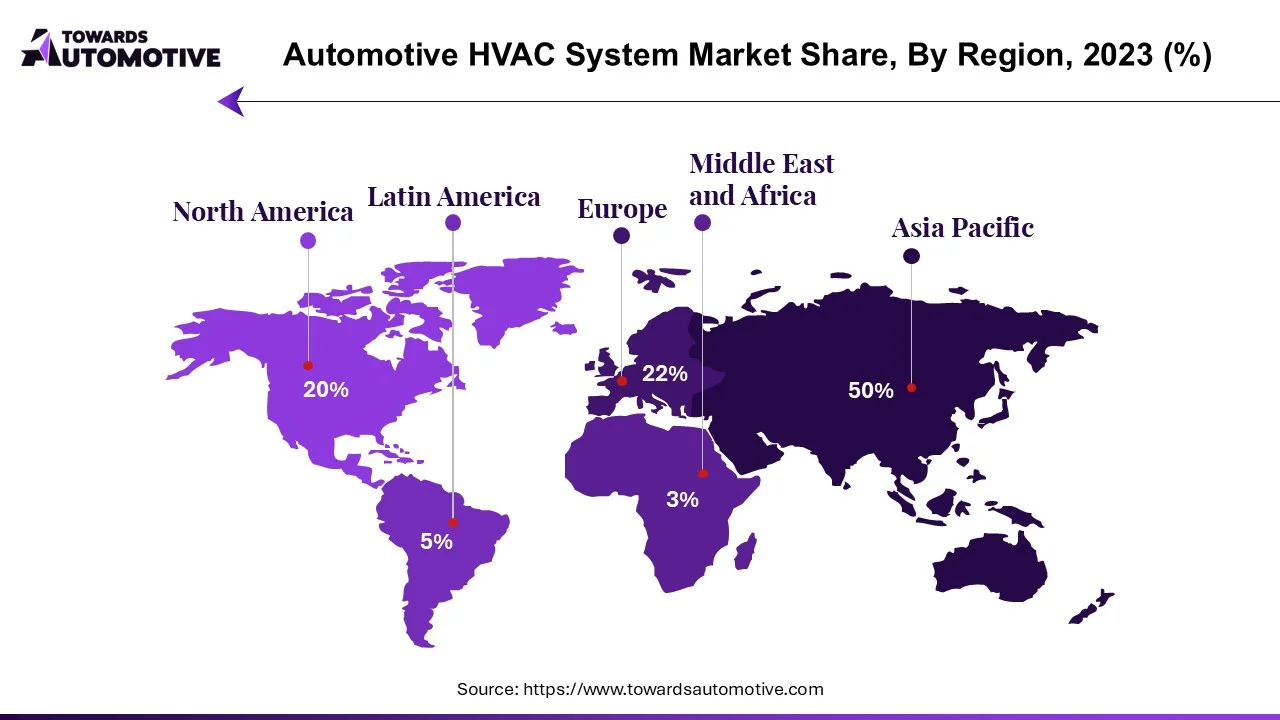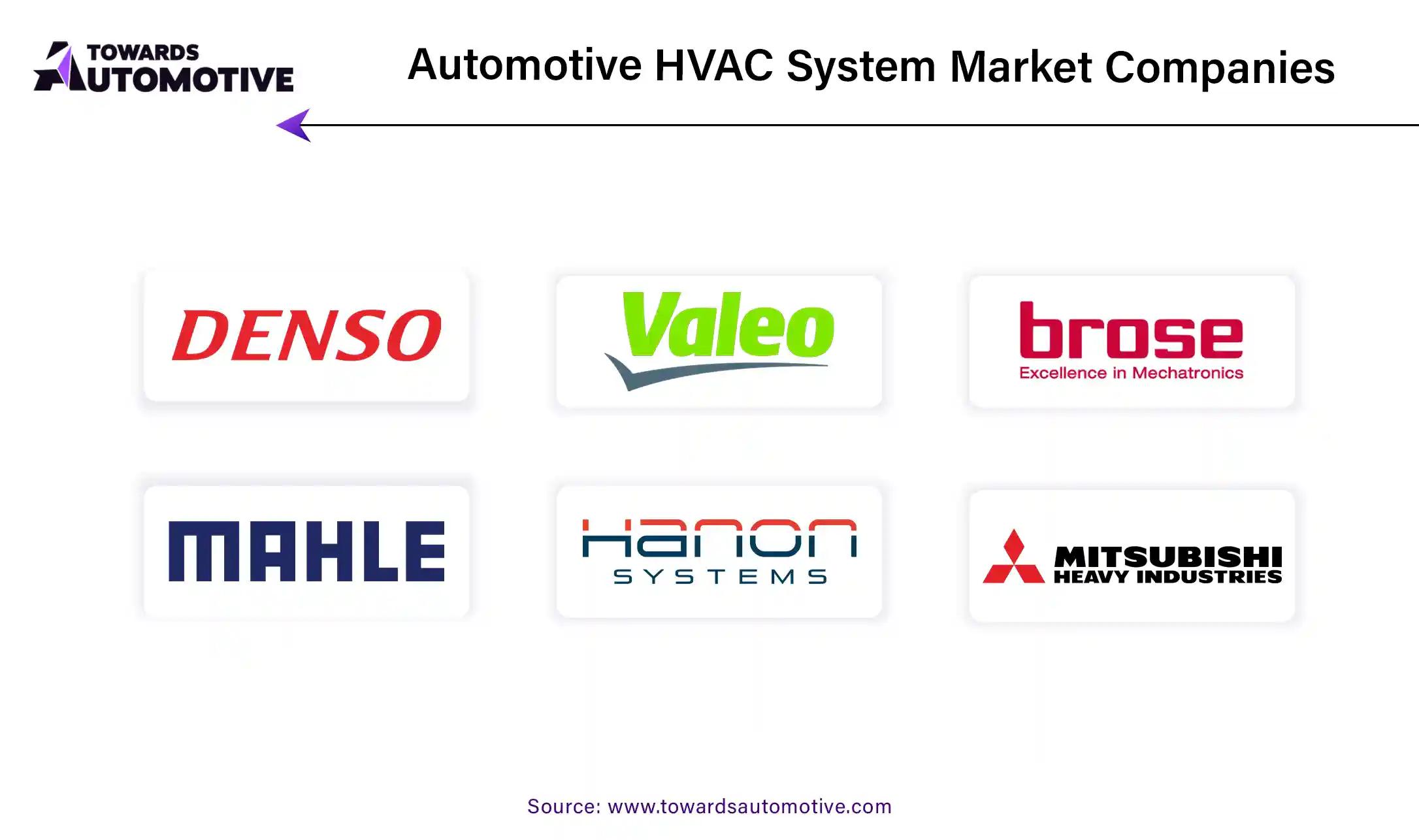April 2025
The automotive HVAC system market size is calculated at USD 54.65 billion in 2024 and is anticipated to reach around USD 104.92 billion by 2034, growing at a CAGR of 6.74% from 2025 to 2034.

Unlock Infinite Advantages: Subscribe to Annual Membership
The automotive HVAC system market is an essential segment within the automotive industry, playing a crucial role in enhancing passenger comfort and improving air quality inside vehicles. As vehicles have become more advanced, automotive HVAC systems have evolved to meet the growing demand for energy efficiency, environmental sustainability, and personalized comfort. These systems are responsible for regulating the interior climate of vehicles, ensuring optimal temperature and air circulation, and maintaining a pleasant and safe environment for both drivers and passengers. The market is driven by factors such as the increasing demand for luxury vehicles, stricter emission regulations, rising consumer expectations for comfort, and the growing emphasis on energy-efficient and eco-friendly solutions.
Additionally, the integration of advanced technologies like smart sensors, air purification systems, and climate control features has further accelerated the adoption of HVAC systems in modern vehicles. As electric vehicles (EVs) gain traction, the automotive HVAC system market is witnessing innovations to cater to the unique needs of these vehicles, which require efficient heating and cooling without compromising battery performance. With the continued growth of the automotive sector, the HVAC system market is poised for significant expansion, offering numerous opportunities for manufacturers and suppliers to provide cutting-edge solutions that enhance the driving experience and meet evolving consumer demands.
AI plays a significant role in the automotive HVAC system market by enhancing the efficiency, performance, and personalization of heating, ventilation, and air conditioning systems in vehicles. The integration of AI in HVAC systems enables the development of smart climate control features, which are capable of learning user preferences and adjusting settings accordingly. Through machine learning algorithms and sensors, AI can analyze and predict the optimal interior temperature and airflow conditions for drivers and passengers, improving comfort while reducing energy consumption.
AI-powered systems can also optimize energy usage, an important factor for electric vehicles (EVs), where maintaining battery efficiency is critical. AI can analyze factors such as outside temperature, humidity, and cabin conditions to intelligently regulate the HVAC system, ensuring minimal impact on battery life. Furthermore, AI enables the integration of voice recognition and gesture control for managing HVAC functions, providing a more intuitive user experience.
Additionally, AI can enhance the performance of air quality control systems, including air purification and filtration. By continuously monitoring air quality and detecting pollutants or allergens in the cabin, AI systems can automatically adjust the HVAC system to ensure a clean and healthy environment. As AI continues to advance, its role in the automotive HVAC system market will expand, driving innovations that improve system reliability, user comfort, and the overall sustainability of vehicles.
Growing investment in the aviation sector is a significant driver of the general aviation market, as it fosters technological innovation, expands infrastructure, and increases overall market accessibility. Increased funding from both private investors and government agencies has spurred the development of new, more efficient aircraft, advanced avionics, and innovative safety systems, making general aviation more appealing to a broader audience. Investments in sustainable aviation technologies such as electric aircraft and hybrid propulsion systems, are also gaining momentum, addressing environmental concerns and attracting environmentally conscious consumers.
Moreover, substantial investments in airport infrastructure such as the expansion of smaller regional airports, improvements in hangars and maintenance facilities, and the development of dedicated terminals for general aviation are enhancing the accessibility and convenience of private flying. These infrastructure advancements not only make general aviation more viable for a wider range of users but also help reduce congestion at commercial airports, improving overall efficiency.
Additionally, as more capital flows into the sector, new services such as air taxis, on-demand charter flights, and unmanned aerial vehicle (UAV) operations are emerging, further expanding the scope of the general aviation market. With investments driving innovation, accessibility, and efficiency, the general aviation market is poised for sustained growth, meeting the rising demand for flexible, cost-effective, and sustainable air travel options across various sectors.
The automotive HVAC system market faces several restraints that could impact its growth. High manufacturing and maintenance costs associated with advanced HVAC systems, including the integration of energy-efficient and eco-friendly technologies, may limit their adoption, particularly in lower-cost vehicle segments. Additionally, the complexity of HVAC systems in electric vehicles (EVs) can pose challenges in balancing climate control with energy efficiency, affecting overall battery performance. Furthermore, regulatory challenges, such as stringent emission standards, add pressure on manufacturers to develop compliant yet cost-effective solutions.
The rising adoption of intelligent climate control systems in cars is creating significant opportunities in the automotive HVAC system market. Intelligent climate control systems, powered by advanced technologies such as AI, machine learning, and smart sensors, enable vehicles to automatically adjust temperature, airflow, and air quality to optimize comfort for passengers. These systems can learn user preferences and make real-time adjustments based on factors like ambient temperature, humidity, and driving conditions, providing a highly personalized experience. As consumers increasingly demand vehicles that offer greater convenience and customization, the market for intelligent climate control systems is rapidly expanding.
In addition to improving comfort, intelligent climate control systems contribute to energy efficiency, a key consideration in the growing electric vehicle (EV) market. By using AI to predict and optimize HVAC system usage based on external conditions and battery charge levels, these systems help minimize energy consumption, preserving the vehicle's battery life. This technology is crucial for ensuring that EVs maintain optimal performance while providing an enjoyable driving experience. Furthermore, the integration of advanced air purification and filtration technologies within intelligent climate control systems is enhancing the air quality inside vehicles, addressing growing consumer concerns about pollutants and allergens. As demand for smarter, more efficient, and user-friendly climate control systems increases, the automotive HVAC market is poised for continued growth, driven by innovations in intelligent technology.
The passenger cars segment held a dominant share of the market. The passenger car segment plays a significant role in driving the growth of the automotive HVAC system market. As the largest category in the automotive industry, passenger cars account for a substantial share of the demand for advanced heating, ventilation, and air conditioning systems. With rising consumer expectations for comfort, convenience, and customization, modern passenger vehicles are increasingly equipped with sophisticated HVAC systems. These systems provide enhanced climate control features such as multi-zone temperature settings, personalized airflow preferences, and air purification technologies, ensuring a comfortable driving experience for both drivers and passengers.
In addition to comfort, the growing emphasis on energy efficiency and sustainability in passenger cars is further driving the demand for advanced HVAC solutions. With the rise of electric vehicles (EVs), automakers are focusing on developing energy-efficient HVAC systems that can maintain cabin comfort without compromising battery performance. Intelligent climate control systems, powered by AI and smart sensors, are gaining popularity as they offer precise temperature adjustments based on real-time data, optimizing energy usage.
Moreover, advancements in air quality management, including filtration systems and air purification technologies, are becoming increasingly important in passenger cars, addressing concerns about pollutants and allergens. As passenger vehicles continue to evolve with more high-tech features and consumers prioritize comfort and convenience, the passenger car segment will remain a key driver of growth in the automotive HVAC system market.

The automatic segment led the industry. The automatic segment of the automotive HVAC system market is a key driver of growth, as it enhances both the convenience and efficiency of climate control systems in vehicles. Automatic HVAC systems, which adjust temperature, humidity, and airflow based on real-time environmental conditions and passenger preferences, provide a seamless and hands-free experience for users. This automation reduces the need for manual adjustments, improving convenience for drivers and ensuring a consistently comfortable cabin environment. As consumer expectations rise for more personalized and effortless control, the demand for automatic HVAC systems is increasing, particularly in mid-range to high-end vehicles.
In addition to enhancing comfort, automatic HVAC systems are contributing to energy efficiency by optimizing the use of heating and cooling systems. By intelligently regulating the system based on external temperatures and internal cabin conditions, these systems help reduce unnecessary energy consumption, which is especially important in electric vehicles (EVs) where energy efficiency is crucial for preserving battery life. The growing adoption of smart climate control features powered by sensors and AI also enables automatic HVAC systems to learn users’ preferences, providing a more customized experience.
Furthermore, advancements in air purification and filtration systems integrated with automatic HVAC solutions are gaining traction as consumers become more conscious of air quality and environmental sustainability. As a result, the automatic segment is driving significant growth in the automotive HVAC market, particularly as automakers continue to integrate cutting-edge technology into their vehicles.

Asia Pacific dominated the automotive HVAC system market. Increasing vehicle production and sales, growing adoption of electric vehicles (EVs), and technological advancements are key factors driving the growth of the automotive HVAC system market in the Asia-Pacific (APAC) region. As countries like China, India, and Japan experience rapid urbanization and expanding middle-class populations, vehicle ownership has surged, creating a strong demand for advanced automotive HVAC systems. With more vehicles on the road, especially in emerging markets, the need for efficient and reliable climate control systems to ensure passenger comfort has grown significantly.
The growing adoption of electric vehicles (EVs) in APAC is another major factor propelling market growth. As governments in the region introduce incentives and stricter emission regulations, EV adoption continues to rise, creating a need for energy-efficient HVAC solutions. Unlike traditional vehicles, EVs require HVAC systems that are optimized to reduce energy consumption and preserve battery life. This has led to innovations in HVAC systems, such as heat pumps and more efficient climate control systems, specifically designed for electric vehicles.
Moreover, technological advancements and innovations in HVAC systems, including the integration of AI, smart sensors, and automated climate control features, have improved efficiency and passenger comfort. These technologies allow for personalized climate control, energy optimization, and improved air quality, making the overall driving experience more enjoyable. As these trends continue to evolve, the automotive HVAC system market in APAC is set to expand rapidly, driven by increased vehicle production, EV growth, and ongoing innovation.
Europe is expected to grow with a significant CAGR during the forecast period. In Europe, the growth of the automotive HVAC system market is being driven by a focus on air quality and health, the rise in luxury and premium vehicle demand, and rising consumer expectations for comfort. As awareness of indoor air quality increases, European consumers are placing greater emphasis on clean and healthy air inside their vehicles. This has led to the development of advanced air purification and filtration systems integrated with HVAC solutions to remove allergens, pollutants, and bacteria. The demand for these advanced HVAC systems is particularly strong in premium and luxury vehicles, where consumers expect superior comfort and air quality features.
Additionally, the increasing sales of luxury and premium vehicles in Europe are propelling the market for advanced HVAC systems. These vehicles often come equipped with multi-zone climate control, personalized temperature settings, and cutting-edge air quality management, enhancing the overall driving experience. As the focus shifts towards offering more premium and bespoke experiences, automakers are integrating more sophisticated HVAC systems to meet consumer demands.
Rising consumer expectations for comfort also play a significant role. With the growing desire for a more personalized and seamless in-vehicle experience, consumers expect HVAC systems that can automatically adjust based on their preferences, the weather, and other environmental factors. These combined factors are driving the automotive HVAC system market in Europe, as both technological advancements and changing consumer preferences shape the future of climate control in vehicles.

By Technology
By Vehicle
By Region
April 2025
April 2025
April 2025
April 2025
We offer automotive expertise for market projections and customizable research, adaptable to diverse strategic approaches.
Contact Us